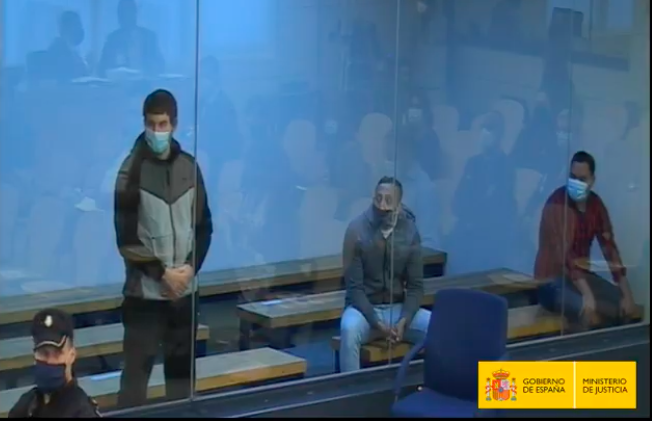10.11.2020 - 14:12
|
Actualització: 10.11.2020 - 15:12
On 17 August 2017, a white van drove into a crowd in Barcelona’s La Rambla boulevard, causing mayhem and bloodshed. The attacker fled in a stolen car after killing the driver. Hours later, after midnight, five other men stabbed a woman in a nearby seaside town. In all, 16 people died and 140 were injured. All men directly responsible for the attacks were eventually killed by police. But they were later found to be part of a larger jihadist cell – one that was preparing attacks on an even bigger scale.
On 10 November 2020, more than three years after the attacks, the alleged remaining members of the group began facing trial in Spain’s National Court. Here’s a quick guide to the case, the defendants, the charges, and what to expect from this trial.
Who are the three men accused?
Mohamed Houli Chemal, Driss Oukabir, and Said Ben Iazza. The former two are accused of belonging to the jihadist cell behind the 2017 attacks, but did not participate in them. Iazza is on trial for aiding the cell without being an active member.
What happened to the other members?
Police investigations identified ten active members of the cell. They were all relatively young, from 17 to 28 years old, with one exception: Abdelbaki Es Satty, 41, the ringleader who recruited the other members while working as an imam in their hometown, Ripoll, who was connected to the Spanish intelligence. This connexion remains unclear and has not been investigated.
The day before the attacks, an accidental explosion blew up a house in Alcanar, a coastal town between Barcelona and Valencia, where the cell had been preparing explosives. The blast killed Es Satty and another member of the cell. The only survivor was Chemal.
The group’s initial plan was bombing the likes of the Camp Nou football stadium, the Sagrada Família basilica, or even the Eiffel Tower. With the explosives gone and their leader dead, they were left without a plan. One of them rammed a rented van into one of Barcelona’s most crowded spots and escaped. After a 3-day manhunt, he was gunned down. His name was Younes Abouyaaqoub.
In the early hours of August 18, when police were searching Abouwaaqoub, five fellow jihadists drove to the seaside town of Cambrils, south of Barcelona. They were killed by police officers after stabbing a woman, who later died from her injuries.
When were the three accused detained?
Houli was arrested in hospital while still healing from the wounds suffered in the Alcanar explosion. Oukabir was detained in Ripoll. The van used by Abouyaaqoub was rented under his name. While he alleges no links with the terrorist group, some of his private messages suggest he may have joined the group some weeks prior to the attacks, but gave up on the plan at the last minute.
Saïd ben Iazza was arrested on September 22, a month after police officers interviewed him as a witness in Vinarós, a Valencian town close to Alcanar. He told officers he knew two members of the cell because they frequented his uncle’s butcher’s shop, where he worked. He admitted lending them his ID and a car, but denied knowing that they were going to use it to buy the raw materials needed to make explosives.
What criminal charges are public prosecutors pursuing?
While Houli and Oukabir could face criminal charges worth 41 and 36 years in prison, as requested by the public prosecutor, neither is deemed directly responsible for the deaths caused by the cell. They are accused of possessing explosives, belonging to a terrorist organization, and conspiring to wreak havoc. Iazza, whom public prosecutors consider an “indispensable collaborator”, faces a proposed prison sentence of 8 years.
What sentences are other prosecutors demanding?
Apart from the public prosecutors’ office, there are other organizations acting as prosecutors in the trial. Among those are the Catalan government and Barcelona city council, who request higher prison sentences for Houli and Oukabir, ranging from 44 to 95 years in prison, for the same crimes. The town council of Cambrils is also pressing murder charges and asks for revisable permanent imprisonment—the highest prison sentence allowed by Spanish law.
Associations of terrorism victims and police unions are also adding murder charges for Houli and Oukabir, and demand prison sentences of 2,000 and 5,000 years respectively, as well as the revisable permanent imprisonment. The prison sentence requested for Iazza ranges between 10 to 30 years.


